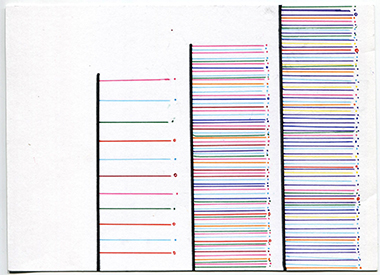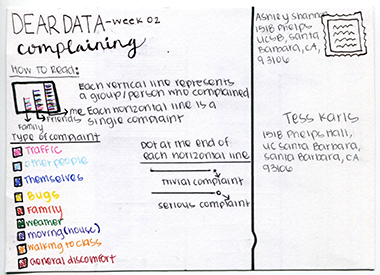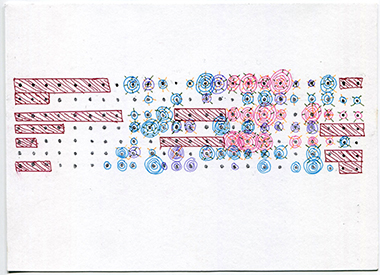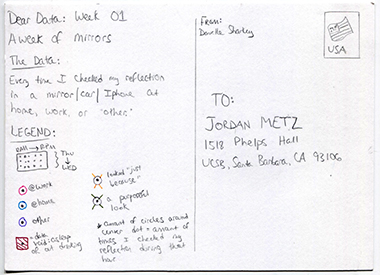identity
Because the Dear Data project is very much about personal data, it yielded opportunities for students to learn about themselves. Giorgia Lupi and Stefanie Posavec (2015) explicitly commented on their project as offering this potential: "over one year, the process of actively noticing and counting these types of actions became a ritual. It actually changed ourselves. We became much more in tune with ourselves, much more aware of our behaviors and our surroundings." With only two weeks of personal data collection compared to Lupi and Posavec's year, students nevertheless saw the potential—and the complications—in this path to greater self awareness, as Takako Suzuki expresses in this video clip.
data and self-knowledge
Students read Gary Wolf's (2010) "The Data-Driven Life" and learned about others who engage in more technology-based "self-tracking"—gathering data about themselves in order to solve a particular problem (e.g., tracking caffeine consumption and sleep patterns), achieve a health goal (e.g., counting steps and calories), or just generally learn more about themselves and their lives. Describing the Quantified Self "movement," Wolf observed that "The goal isn't to figure out something about human beings generally but to discover something about yourself." Wolf explicitly contrasted this data-driven and numerical approach with the language-based approach to self-discovery inherent in psychology and psychoanalysis. Jordan Metz took up this contrast and its implications for how we think of the self when she wrote, "The experience of self-tracking in the midst of our current climate of data overload raises a lot of questions about the idea of self. Is the self something buried deep within our consciousness, or is it the sum of seemingly meaningless actions—like checking our phone or buying something from Amazon?"
Although not necessarily seeing the self as "the sum of seemingly meaningless actions," some students were able to gain insights about themselves from the Dear Data project. For instance, during week 1 Ashley Shannon kept track of complaints, and in her reflection she observed that "My friends and I seem to use complaining as a way to entertain ourselves. After realizing this, I noticed any time there's a silence when I'm around people, I often get the urge to complain; sometimes even about something completely unrelated to the situation." In her interview, Tess Karls described the insights she gained about how the passage of time feels, based on her experience collecting daily data.
For some, the Dear Data project yielded greater self-knowledge primarily by harnessing the power of mindfulness. In her foreword to Dear Data, Maria Popova (2016) cited William James: "My experience is what I agree to attend to." She described experience "always filtered through the discriminating yet imperfect lens of attention" (p. vii). As students paid careful attention to some aspect of their behavior each week, they learned about themselves in that small but sometimes significant area. As Victoria Penate put it, "one essential piece of this process is simply the intention of mindfulness itself."
topic choice and motivation
Some students were intentional in focusing on aspects of their lives about which they had questions. Thomas Matthews wrote, "I realized that what I really wanted to do was find a way to quantify or characterize some of the decisions I make and see if there was an objective way I could make more efficient/effective use of my time and money." Other students chose topics that they felt strongly about. For instance, Hannah Drennan decided to track the food waste and plastic use in her household, and she concluded that "the story that my data told was one of a costly misunderstanding of how our food system functions." By viewing the 52 different topics selected by Lupi and Posavec (2016) and by hearing about the topics selected by their peers, students came to see how, in Patrick Danner's (2018) terms, data becomes. Danner claimed that "the ontological life of data begins when researchers determine that an event or entity counts as data. This determination is the product of situational and ambiguous forces." Christine Borgman (2018) posed the same question somewhat differently when she asked "when are data?" As Borgman noted, entities become data at a specific point, when "a scholar recognizes that an observation, object, record, or other entity could be used as evidence of phenomena and then collects, acquires, represents, analyzes, and interprets those entities as data" (p. 166). For students, seeing aspects of their daily lives as potential data entailed a shift in perspective and a different, possibly more productive approach to understanding themselves and answering questions about their own behavior.
Students also came to realize that their behavior changed because they were observing it. For some, this was their goal: they were paying attention to a habit or a behavior precisely in order to change it. For instance, Cindy Thai wrote that "one of my summer goals this year is to have a healthier lifestyle. I thought keeping track of my healthy decisions would help me see if I am actually making as many healthy choices as I would like…. [H]aving to keep record of my healthy habits also made me want to be more healthy. I found that I was more willing to go to the gym and take care of myself mentally as well as physically." But this changed behavior also revealed to students that their data was not representative of a typical week and that their observations weren't entirely objective. For example, Danielle Sharkey tracked how often she looked in the mirror in week 1, and she noted that toward the end of the week she actively avoided looking "because I had so much data!" As Lupi and Posavec (2016) put it, "By noticing our behaviour, we were influencing our behaviour" (p. x). Through the project, students gained direct experience with observer bias and its impact on data.
the partner element
Finally, one key difference between the Dear Data project in this course and the project Lupi and Posavec (2016) undertook is that the students didn't partner up with each other aside from sharing drafts and writing another student's name on each postcard. For Lupi and Posavec, in contrast, an important part of the project was communicating with and learning about each other: "This book is the story of how we, Giorgia and Stefanie, became friends through revealing to each other the details of our daily lives" (p. ix). Although living on separate continents, they worked on the same topics each week and so shared the focus of their attention; they anticipated the arrival of each other's postcards and read them with delight. Unfortunately a 3-week class project was too short to establish this kind of connection; we couldn't even mail the postcards because the varying time it would take for them to arrive would disrupt the class schedule. The element of communication with a partner and shared experience effectively dropped out of this version of the Dear Data project.



